Why Co-Dependency Feels Draining: Adrenal Fatigue and Supplements That Help
Introduction
Co-dependency doesn’t just hurt emotionally—it wears down your entire body. The constant overthinking, emotional caretaking, and fear of rejection can leave you exhausted in ways sleep alone can’t fix. Many people who live with co-dependent patterns describe feeling “wired but tired,” emotionally depleted yet unable to relax. This isn’t just mental fatigue—it’s adrenal fatigue, the body’s physiological response to years of chronic stress.
In this in-depth guide, we’ll explore how co-dependency and adrenal exhaustion are connected, what’s happening inside your body when you feel emotionally drained, and how certain supplements and natural supports can help you restore balance, energy, and peace. 🌸
Looking for supplements for This? Click here.
The Emotional Cost of Co-Dependency 🧠💞
Co-dependency is an emotional survival strategy born from unstable attachment. When love feels uncertain, the brain learns to stay hypervigilant—reading moods, overanalyzing tone, anticipating rejection, and trying to manage other people’s emotions.
Over time, this constant emotional labor triggers the body’s stress response system—the hypothalamic-pituitary-adrenal (HPA) axis. What begins as a psychological coping pattern soon becomes a biological imbalance. Your body is no longer resting; it’s surviving.
You wake up tired. You go to sleep anxious. You can’t switch off, because deep down your nervous system believes that if you stop being vigilant, you’ll lose safety or love.
This is the biochemical root of why co-dependency feels draining: your adrenals, which produce stress hormones like cortisol and adrenaline, are stuck in overdrive.
The Adrenal Glands: Your Tiny Stress Responders ⚡

Your adrenal glands sit just above your kidneys, small but mighty. They regulate your body’s reaction to stress by releasing hormones that control energy, blood pressure, and metabolism.
When life feels balanced, the adrenals release cortisol in a steady rhythm—rising in the morning to wake you up and lowering at night to help you sleep. But when stress becomes chronic, the glands can’t rest.
If you live in co-dependent mode—constantly people-pleasing, fearing disconnection, or rescuing others—your body interprets that emotional stress as physical danger. Every text, silence, or argument triggers your fight-or-flight response, causing cortisol and adrenaline to surge.
Eventually, your adrenals can’t keep up. They start releasing stress hormones irregularly, and you feel it as:
💤 unrelenting fatigue
💓 heart palpitations or restlessness
💭 mental fog or forgetfulness
😣 emotional burnout
🌙 insomnia mixed with exhaustion
This is adrenal fatigue—a condition of burnout in the body’s stress-regulation system.
The Link Between Emotional Burnout and Hormonal Imbalance 🌩️
Chronic stress from co-dependency doesn’t just exhaust your mind—it disrupts your hormones. When cortisol stays elevated for too long, it suppresses other vital systems, including the thyroid, reproductive hormones, and immune function.
That’s why so many people in long-term emotionally demanding relationships experience weight changes, menstrual irregularities, low libido, or frequent colds. The body has diverted all its energy into survival mode, leaving nothing for maintenance.
The constant adrenaline and cortisol spikes also disturb blood sugar and mood stability. One minute you feel alert and anxious, the next completely drained. This rollercoaster of highs and lows mirrors the emotional instability of co-dependent relationships.
The truth is, the body doesn’t separate emotional pain from physical stress—it reacts to both the same way. Over time, what began as emotional exhaustion becomes full-body depletion.
The Phases of Adrenal Fatigue in Co-Dependency 💫
Adrenal fatigue often follows three stages—each reflecting how deeply the body is stuck in survival.
In the first stage, the adrenals are overactive. You feel wired all the time—anxious, alert, unable to rest. Sleep doesn’t refresh you because cortisol stays high at night. You might even feel a strange energy rush before bed, often mistaken for productivity, when it’s actually stress chemistry.
In the second stage, the adrenals start to falter. Cortisol levels fluctuate unpredictably. You feel bursts of energy followed by sudden crashes. Mornings become harder, and coffee feels essential. You may crave sugar or salt because your body is struggling to stabilize energy levels.
In the third stage, the adrenals are fatigued. You feel chronically tired, emotionally flat, and easily overwhelmed. Even small tasks feel monumental. You may experience anxiety mixed with apathy—a sign that your nervous system is simply out of fuel.
This cycle mirrors co-dependency perfectly: the endless giving, the desperate attempts to fix, the emotional highs and crashes, and finally, the hollow numbness that sets in after years of trying too hard.
The Stress Loop: Why You Can’t Rest 😩
Co-dependency traps you in a feedback loop of emotional and physical exhaustion. Every attempt to gain peace through others—through fixing, controlling, or seeking approval—activates the same hormonal stress response.
When your body learns that stress equals connection, it begins to crave the adrenaline of relational chaos. The silence after conflict feels unbearable because your cortisol drops suddenly, leaving you feeling empty or restless. You might unconsciously seek new stress just to feel “alive” again.
It’s not self-sabotage—it’s survival wiring. But to break this cycle, your body must learn safety without chaos. That’s where nutrition, supplements, and nervous system support come in.
Supporting the Adrenals Naturally 🌿
Healing from adrenal fatigue means nourishing your body back to equilibrium. You can’t just “rest more” when your chemistry is depleted—you need to rebuild your internal foundation.
One of the most effective ways to start recovery is by using adaptogens and micronutrients that restore adrenal function, balance hormones, and soothe the nervous system. Let’s look at how they work.
🌱 Ashwagandha: The Cortisol Calmer
Ashwagandha is a powerful adaptogenic herb that helps lower cortisol levels and stabilize the stress response. It doesn’t sedate you—it balances you.
For those recovering from co-dependency, Ashwagandha helps break the hypervigilant cycle by calming the amygdala (the brain’s fear center). It promotes a sense of safety, allowing your nervous system to rest without collapsing. Many people describe it as “feeling grounded again.”
🌿 Rhodiola Rosea: The Energy Restorer
Rhodiola supports dopamine and serotonin while reducing fatigue and improving mood stability. It helps your body adapt to stress rather than overreact to it.
For emotionally exhausted individuals, Rhodiola brings back motivation and mental clarity. It helps you rebuild energy gently without overstimulation, perfect for those who feel emotionally flat after long-term caregiving or relational stress.
🌻 Licorice Root: The Gentle Adrenal Support
Licorice root helps extend the half-life of cortisol in the body, giving your adrenals a break from overproduction. It’s particularly useful in later stages of fatigue when cortisol levels are low.
It also supports blood pressure and electrolyte balance, both of which often dip during adrenal burnout. However, it should be used cautiously under guidance if you have high blood pressure.
🧘 Holy Basil (Tulsi): The Emotional Soother
Holy Basil helps reduce anxiety, stabilize blood sugar, and lower cortisol. It’s both an adaptogen and a mild antidepressant.
For co-dependency recovery, Holy Basil provides emotional balance—it helps the body stay calm during moments of uncertainty or relational tension. It encourages peace without numbing your emotions.
🐟 Omega-3 Fatty Acids: The Brain Repair Tool
Omega-3s are vital for hormone balance, neurotransmitter function, and inflammation control. Chronic stress depletes brain cell membranes, but omega-3s rebuild them—restoring clarity, focus, and resilience.
They also support dopamine and serotonin balance, helping you feel emotionally steady rather than reactive. Think of them as cushioning for your nervous system.
🌾 Magnesium: The Nervous System’s Best Friend
Magnesium is essential for muscle relaxation, cortisol regulation, and GABA activation—the neurotransmitter that promotes calm.
In adrenal fatigue, magnesium is often depleted. Restoring it improves sleep, reduces anxiety, and eases that tense “wired” feeling common in co-dependent burnout.
Magnesium glycinate and threonate are the most bioavailable forms for calming the mind and supporting brain health.
☀️ B Vitamins: The Stress Energy Complex
Your adrenal glands rely heavily on B vitamins—especially B5 (pantothenic acid), B6, and B12—to produce energy and regulate hormones. Chronic emotional stress burns through these nutrients quickly, leaving you feeling foggy and irritable.
Replenishing B vitamins restores your energy metabolism, enhances mood, and supports neurotransmitter balance. A high-quality B-complex supplement is a must for adrenal recovery.
🌙 Vitamin C: The Forgotten Adrenal Ally
The adrenal glands have some of the highest concentrations of Vitamin C in the body because they use it to produce cortisol and repair tissue. Chronic stress rapidly depletes Vitamin C, weakening immune and adrenal function.
Taking it daily helps your body handle stress more gracefully and recover faster from emotional crashes.
💊 CoQ10 and L-Carnitine: Cellular Energy Boosters
These nutrients support mitochondrial energy—the fuel your body uses to power every cell. During adrenal burnout, mitochondria slow down, leaving you fatigued even after rest.
CoQ10 and L-Carnitine help restore vitality by improving oxygen use and cellular metabolism. They’re particularly helpful if you feel constantly tired or mentally sluggish.
Looking for supplements for This? Click here.
Healing the Root: Rewiring the Stress Response 🧘🌼
Supplements can’t heal emotional wounds—but they create the biochemical stability that allows healing to begin. When your body feels safe, your mind can start letting go of old patterns.
Recovery means retraining your nervous system to recognize that calm doesn’t mean danger, and rest doesn’t mean abandonment. You start setting boundaries not out of fear, but out of self-respect.
Gentle practices like breathwork, yoga, journaling, and time in nature enhance the effects of nutritional support. Each deep breath, each quiet moment tells your body, “You are safe now.” 🌿
Over time, your cortisol levels normalize, your sleep deepens, and your emotional resilience returns. You begin to feel both strong and soft—alert but not anxious, caring but not consumed.
The Body Remembers—But It Can Relearn 🌸
The exhaustion you feel in co-dependency is your body’s way of saying, “I’ve protected you for too long.” For years, your adrenals have stood guard, believing that peace could never last. But with nourishment, rest, and compassion, the body can unlearn its old survival rhythms.
Adrenal healing is not just about supplements—it’s about redefining safety. When you stop chasing peace through others and start cultivating it within yourself, the entire stress system begins to unwind.
You’ll notice small miracles: waking up with more energy, staying calm during uncertainty, feeling joy without fear. These are the signs that your chemistry and your heart are aligning again.
The Takeaway 🌿💛
Co-dependency is draining because it turns your entire physiology into a stress engine. The adrenals, meant for short bursts of protection, end up carrying the weight of chronic emotional survival. But you can rebuild.
With adaptogens like Ashwagandha and Rhodiola, nutrients like Magnesium, Vitamin C, and B-complex, and mindful self-care, your body can remember what calm feels like.
Healing starts when you give your nervous system permission to rest—without guilt. The moment you stop chasing love through exhaustion, your body begins to recharge.
You don’t need to earn peace anymore. You just need to let your body remember it. 🌙💫
Looking for online therapy ? Click Here.
References 📚
Sapolsky, R. M. (2004). Why Zebras Don’t Get Ulcers: The Acclaimed Guide to Stress, Stress-Related Diseases, and Coping.
Panossian, A., & Wikman, G. (2010). Adaptogens in stress and fatigue. Phytomedicine.
McEwen, B. S. (2007). Physiology and neurobiology of stress and adaptation: central role of the brain. Physiological Reviews.
Kennedy, D. O. (2016). Cognitive function, brain energy, and nutritional influences. Nutrition Reviews.
Lanius, R. A., et al. (2010). The impact of chronic stress on the brain and nervous system. Current Directions in Psychological Science.
Related Posts
-
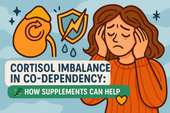
Cortisol Imbalance in Co-Dependency: How Supplements Can Help
Cortisol is the body’s main stress hormone—essential for energy and focus, yet harmful when chronically elevated. When life feels like constant pressure, cortisol imbalance can trigger fatigue, anxiety, and mood swings. Learning how to restore balance through rest, nutrition, and the right supplements can help you rebuild calm, clarity, and resilience from the inside out. 🌿💫
-
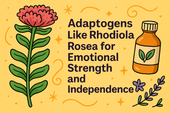
Adaptogens Like Rhodiola Rosea for Emotional Strength and Independence
Adaptogens are nature’s stress-balancing herbs—plants like Rhodiola, Ashwagandha, and Holy Basil that help your body adapt to emotional and physical pressure. They don’t numb or overstimulate; they teach your system how to find calm and stability again. By restoring balance to your hormones, energy, and mood, adaptogens nurture emotional resilience and grounded strength. 🌿✨
-
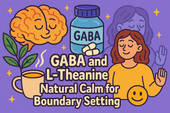
GABA and L-Theanine: Natural Calm for Boundary Setting
Anxiety can feel like a storm inside your mind—constant tension, overthinking, and the inability to relax even when you’re safe. But beneath the chaos, your body is simply trying to protect you. Learning to calm anxiety starts with understanding how your brain and nervous system respond to stress—and how to gently guide them back to peace. 🌿💫
-
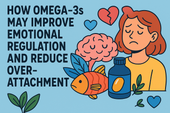
How Omega-3s May Improve Emotional Regulation and Reduce Over-Attachment
Inflammation isn’t just about sore joints or fatigue—it’s also a hidden driver of mood swings, anxiety, and emotional burnout. When chronic stress or poor diet keep the body inflamed, the brain’s chemistry changes, making calm harder to access. Learning how to reduce inflammation through nutrition, rest, and mindful living helps restore balance from the inside out. 🌿💫
-
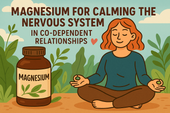
Magnesium for Calming the Nervous System in Co-Dependent Relationships
The nervous system is the body’s communication network, linking your mind and organs through a delicate web of electrical signals. It controls everything from emotional responses to muscle movement—and when it’s overwhelmed by chronic stress or anxiety, balance is lost. Learning how to calm and nourish your nervous system through nutrition, mindfulness, and rest can restore peace and emotional stability. 🌿💫
-
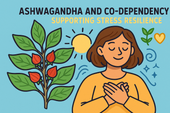
Ashwagandha and Co-Dependency: Supporting Stress Resilience
Stress is more than a feeling—it’s a full-body signal that your system is overwhelmed. When the mind races and the body tenses, your hormones, breathing, and focus all shift into survival mode. Chronic stress doesn’t just affect emotions—it reshapes your nervous system, drains your energy, and clouds your clarity. Learning to understand and manage stress gently is the first step toward peace, balance, and true recovery. 🌿💫
-

The Link Between Anxiety, Co-Dependency, and Natural Support
Anxiety feels like living in constant alert mode—your heart races, your thoughts loop, and your body can’t find peace. It’s the nervous system’s way of preparing for danger, even when none exists. Understanding what’s happening in your mind and body is the first step toward calming the storm and restoring balance. 🌿💫
-

Supplements That Support Dopamine and Serotonin in Co-Dependent Patterns
Serotonin is the neurotransmitter of calm, confidence, and contentment. When it’s balanced, you feel peaceful and emotionally grounded. When it’s low, anxiety, mood swings, and emotional dependence take over. By understanding serotonin’s role in emotional health—and how to support it naturally—you can rebuild inner stability, improve relationships, and cultivate lasting happiness from within. 🌞💫
-

How Emotional Exhaustion in Codependency Impacts the Nervous System
The nervous system is the body’s communication network, connecting the brain to every organ and muscle. It regulates stress, mood, and emotion through a delicate balance of electrical and chemical signals. When overwhelmed, it can become dysregulated—leading to fatigue, anxiety, and emotional imbalance. Understanding how to calm and strengthen the nervous system is key to healing from chronic stress and emotional burnout. ⚡🌿
-

What Is Co-Dependency? The Role of Brain Chemistry and Stress
Stress is more than a feeling—it’s a full-body experience that begins in the brain and ripples through every cell. When cortisol surges and the nervous system stays on alert, your body can’t rest or recover. Over time, this constant tension affects energy, focus, mood, and even immune health. Understanding stress chemistry is the first step toward breaking free from burnout and finding calm again. 🌿
-

Creating a Supplement Stack for Motivation, Energy, and Anti-Procrastination
Motivation is the fuel behind every meaningful achievement—but it’s not just about willpower. It’s a mix of mindset, brain chemistry, and momentum. When energy, focus, and purpose align, action feels natural instead of forced. Learn how to harness motivation as a daily state, not a fleeting feeling.
-

Supplements for Building Consistency and Reducing Chronic Procrastination
Biochemistry is the bridge between biology and chemistry—the science of life at the molecular level. It explains how nutrients, hormones, and neurotransmitters interact to create energy, thought, and emotion. From brain function to muscle movement, biochemistry reveals the invisible processes that sustain health, balance, and vitality.
-

GABA and Procrastination: Supporting Calm Focus for Productivity
GABA is the brain’s natural calming messenger—a neurotransmitter that helps slow mental overactivity and ease stress. When GABA levels drop, focus fades, anxiety rises, and procrastination becomes more likely. By supporting GABA through nutrition, lifestyle, and supplements, you can restore calm clarity, improve focus, and take action with steady, balanced energy.
-

Ashwagandha and Procrastination: Lowering Stress to Improve Action
Science is the language of curiosity and discovery. It helps us understand the hidden patterns behind life, energy, and the universe. Through experimentation and critical thinking, science connects imagination to evidence—turning questions into knowledge. Whether through microscopes, molecules, or minds at work, science represents our endless pursuit of truth and innovation.
-

Neurotransmitters and Motivation: Supplements That Support Drive and Focus
Supplements can do more than boost physical health—they can also enhance mental clarity, focus, and motivation. Nutrients like omega-3s, magnesium, B vitamins, and adaptogens help balance neurotransmitters, stabilize mood, and support brain energy. When combined with good sleep, nutrition, and mindful habits, they can transform how your brain performs under stress.
-

How Stress Hormones Like Cortisol Fuel Procrastination (and What Helps)
Blood sugar isn’t just about physical health—it directly impacts focus, mood, and motivation. When glucose levels spike and crash, energy and attention do the same, fueling procrastination and brain fog. Learning how to stabilize blood sugar through balanced meals, mindful habits, and key nutrients helps keep your mind steady, focused, and ready to act.
-

Brain Fog and Procrastination: Supplements for Mental Clarity
Brain fog can turn even simple tasks into mental hurdles. When your thoughts feel slow and unclear, procrastination often follows—making focus and productivity seem impossible. This article explores the biochemical and lifestyle causes of brain fog and reveals the most effective supplements for restoring mental clarity, focus, and sustained energy.
-

The Link Between Low Energy and Procrastination: Can Supplements Help?
Neurochemistry shapes how we think, feel, and act. When neurotransmitters like dopamine, serotonin, and GABA fall out of balance, it can lead to fatigue, anxiety, or lack of motivation—fueling procrastination and low mood. Understanding the brain’s chemical communication system helps us find ways to restore focus, calm, and emotional stability through nutrition, mindfulness, and targeted supplements.
-

Why Do We Procrastinate? The Role of Dopamine and Supplements That Support It
Dopamine is the brain’s motivation messenger—the chemical that fuels focus, reward, and drive. When dopamine levels drop, even simple tasks can feel impossible to start. This article explores how dopamine shapes procrastination, motivation, and mental energy, along with natural supplements and daily habits that help restore balance and get things done.
-

Phosphatidylserine and Stress Reduction for People with BDD
Stress is more than a mental state—it’s a full-body experience that affects hormones, brain chemistry, and emotional balance. For people with Body Dysmorphic Disorder (BDD), constant tension and worry about appearance can overload the nervous system. Learning how stress works and finding ways to calm it is key to breaking the cycle of anxiety and self-criticism.
-

How Antioxidants Like Vitamin C & E Support Mental Health in BDD
Antioxidants are the body’s natural defense against stress and inflammation. For people with Body Dysmorphic Disorder (BDD), oxidative stress can worsen fatigue, anxiety, and emotional imbalance. Nutrients like Vitamin C and E help protect brain cells, boost neurotransmitter function, and support a calmer, clearer mindset—building a stronger foundation for recovery.
-

Ginkgo Biloba and Memory Support for BDD Recovery
Emotional regulation is the foundation of healing from Body Dysmorphic Disorder (BDD). When the nervous system stays in constant overdrive, even small stressors can trigger self-critical spirals. Learning to calm emotional reactivity helps restore clarity, confidence, and a sense of inner balance. By blending mindfulness, nervous system support, and self-compassion, you can retrain your brain to respond—not react—to emotion.
-

Alpha GPC and Cognitive Function in Body Dysmorphic Disorder
Mental fatigue can feel like your brain has hit a wall—thoughts slow down, focus fades, and motivation disappears. For people with Body Dysmorphic Disorder (BDD), chronic overthinking, emotional stress, and constant self-evaluation can deplete mental energy even further. Understanding what causes this cognitive exhaustion is the first step toward recovery—through rest, balanced nutrition, and targeted brain-supporting supplements.
-

N-Acetyl L-Tyrosine and BDD: Supporting Mental Clarity
Chronic stress doesn’t just affect your mood—it reshapes your brain chemistry, weakens focus, and fuels the obsessive thought loops common in Body Dysmorphic Disorder (BDD). Over time, constant cortisol elevation drains mental energy and emotional balance. Learning to recognize and manage chronic stress is essential to restoring mental clarity, self-compassion, and resilience.
-

Chamomile and Lavender for Calming Obsessive Body Image Thoughts
The nervous system is the command center of our emotional and physical world—and in Body Dysmorphic Disorder (BDD), it often operates in overdrive. Understanding how the brain and body communicate under stress reveals why intrusive thoughts feel uncontrollable. Learning to regulate the nervous system through calm practices, nutrition, and supplements helps restore inner balance and emotional safety.
-

Adaptogens for Body Dysmorphic Disorder: Rhodiola, Ginseng, and More
Rhodiola rosea, often called the “golden root,” is an adaptogenic herb renowned for boosting stress resilience and mental endurance. For individuals with Body Dysmorphic Disorder (BDD), Rhodiola may help reduce fatigue, regulate cortisol, and enhance emotional balance. By supporting both mind and body, this powerful plant promotes calm focus, improved mood, and renewed energy to face daily challenges.
-

B Vitamins for Stress Resilience in BDD: Rebuilding Calm from Within
Biochemistry is at the heart of every thought, emotion, and reaction we experience. In Body Dysmorphic Disorder (BDD), chemical imbalances in neurotransmitters like serotonin, dopamine, and GABA can amplify stress and distort self-perception. Understanding the biochemistry behind mood and stress regulation offers a path toward healing—bridging the gap between emotional experience and the body’s molecular balance.
-

Melatonin and Body Dysmorphic Disorder: Restoring Healthy Sleep Patterns
Melatonin, the body’s natural sleep hormone, plays a vital role in helping people with Body Dysmorphic Disorder (BDD) restore healthy sleep cycles. When anxiety and obsessive thinking interfere with rest, melatonin levels often drop, leading to more emotional reactivity and distorted self-perception. This article explores how melatonin works, why BDD disrupts it, and how natural supplementation—combined with mindful routines—can help the brain and body finally find calm at night.
-

Sleep Struggles with BDD: Supplements for Rest and Recovery
When you’re living with Body Dysmorphic Disorder (BDD), restful sleep can feel impossible—but the right supplements can help reset your body’s natural rhythm. From magnesium and L-theanine to 5-HTP and ashwagandha, these nutrients support relaxation, lower cortisol, and enhance melatonin production. This article explores how supplements can calm the mind, ease nighttime anxiety, and promote true restorative sleep for emotional and physical recovery.
-

5-HTP and Serotonin Balance: Could It Help with Body Dysmorphic Disorder?
Anxiety can feel like a storm inside the mind—restless, overwhelming, and hard to control. In people with Body Dysmorphic Disorder (BDD), anxiety often fuels obsessive thoughts and self-criticism, creating a painful cycle of worry and self-doubt. This article explores the biological roots of anxiety, the role of neurotransmitters like serotonin and GABA, and how natural strategies such as mindfulness, supplements, and nervous system regulation can restore calm and mental clarity.
-

Can Ashwagandha Help Ease Stress and Anxiety in Body Dysmorphic Disorder?
Neurotransmitters like serotonin, dopamine, GABA, and acetylcholine are the chemical messengers that shape how we think, feel, and react to stress. In Body Dysmorphic Disorder (BDD), imbalances in these neurotransmitters can amplify anxiety, obsessive thinking, and emotional distress. This article explores how restoring healthy brain chemistry through nutrition, supplements, and mindfulness can help bring clarity, calm, and emotional stability.
-

L-Theanine for BDD: Finding Calm in the Mind
Neurochemistry plays a central role in how we think, feel, and see ourselves. For those living with Body Dysmorphic Disorder (BDD), imbalances in neurotransmitters like serotonin, dopamine, and GABA can intensify anxiety, obsessive thoughts, and emotional distress. This article explores how regulating brain chemistry through supplements, mindfulness, and lifestyle changes can bring the nervous system back into harmony and restore inner calm.
-

Omega-3 Fatty Acids and Body Image Disorders: Supporting Emotional Health
Omega-3 fatty acids do far more than support heart health—they nourish the brain, stabilize mood, and may ease the emotional turbulence tied to body image disorders like BDD. This in-depth article explores how omega-3s regulate serotonin, dopamine, and inflammation, helping individuals reduce obsessive thoughts and rebuild self-acceptance. It also connects nutrition to therapy, mindfulness, and nervous system balance for holistic emotional healing.
-

Magnesium and BDD: Calming an Overactive Nervous System
Magnesium plays a crucial role in calming an overactive nervous system—something people with Body Dysmorphic Disorder (BDD) struggle with daily. This article explores how magnesium supports relaxation, emotional regulation, and stress reduction while diving into the science behind its connection to brain chemistry. It also examines how combining magnesium supplementation with therapy and breathwork can help rebalance the body’s stress response, reduce obsessive thought patterns, and promote lasting nervous system calm.
-

The Gut-Brain Axis and BDD: Why Probiotics Might Matter
The gut and brain are constantly in conversation — and that dialogue may shape how you experience Body Dysmorphic Disorder. By nurturing your microbiome with probiotics, prebiotics, and gut-healing nutrients, you can help rebalance serotonin, calm anxiety, and restore emotional stability from within 🧠🦠.
-
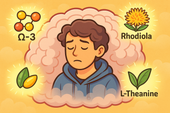
Brain Fog and Body Dysmorphic Disorder: Can Nootropic Supplements Help?
Brain fog often accompanies Body Dysmorphic Disorder, clouding focus and deepening emotional fatigue. Nootropic supplements like L-theanine, Rhodiola, and CoQ10 can help restore mental clarity, balance neurotransmitters, and bring calm energy back to the mind 🌿🧠.
-

How Stress Hormones Like Cortisol May Worsen Body Dysmorphic Disorder
Chronic stress floods the brain with cortisol — the hormone that keeps you on high alert. In Body Dysmorphic Disorder, this chemical overdrive fuels anxiety, distorts self-image, and traps the body in survival mode. Calming cortisol helps restore both peace and perspective 🌿🧠.
-

The Role of Neurotransmitters in BDD—and How Supplements May Help
Neurotransmitters like serotonin, dopamine, glutamate, and GABA shape how people with Body Dysmorphic Disorder perceive themselves. When these brain messengers fall out of balance, perception distorts — but targeted supplements can help restore calm, focus, and emotional regulation 🧠🌿.
-

What Is Body Dysmorphic Disorder? A Deeper Look at the Mind-Body Connection
Body Dysmorphic Disorder (BDD) isn’t just about appearance — it’s about perception. When brain chemistry, trauma, and stress distort self-image, the mind begins to see flaws that aren’t truly there. Healing starts by calming the nervous system and reconnecting mind and body 🪞🧠.
-
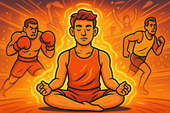
Keeping Calm in Competitive Sports: How to Train Your Mind, Body, and Chemistry for Peak Performance
Competitive pressure can overwhelm even the strongest athletes — but calm is trainable. By combining supplements like magnesium, L-theanine, and adaptogens with breathwork and mindset training, you can stay focused, balanced, and in control under any level of stress 🧠🏅.
-
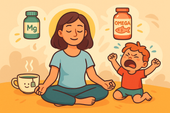
Supplements for Parents Facing Toddler Tantrums: Staying Calm When Little Emotions Run Wild
Toddler tantrums can drain even the most loving parent — but your calm is powerful. With the right supplements like magnesium, L-theanine, and ashwagandha supporting your nervous system, you can stay patient, grounded, and kind, even when emotions run high 🧸🌿.
-

Workplace Stress and Anger Management Support
Workplace stress can quickly turn into frustration — but calm is a skill you can train. By combining supplements like magnesium, L-theanine, and adaptogens with breathwork and mindset tools, you can stay focused, patient, and emotionally grounded no matter how intense the office gets 💼🌿.
-

How to Stay Patient With Family During Stressful Holidays
Holiday gatherings can stir up old stress and test your patience — but calm is possible. With nervous system support from magnesium, L-theanine, and adaptogens, plus mindful breathing and clear boundaries, you can stay centered, kind, and grounded even when family chaos unfolds 🎄💞.
-

Supplements to Keep Calm During Traffic Jams
Getting stuck in traffic doesn’t have to ruin your mood. With calming supplements like magnesium, L-theanine, and ashwagandha, you can train your body to stay relaxed and focused behind the wheel — turning gridlock into a moment of grounded patience 🚗🌿.
-
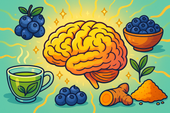
The Role of Antioxidants in Healing Brain Stress from Dissociation
Antioxidants protect the brain from the oxidative stress caused by trauma and dissociation. By neutralizing free radicals and supporting mitochondrial recovery, they help restore clarity, focus, and emotional balance — allowing the mind to heal at the cellular level 🌿🧠.
-
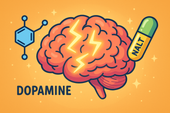
N-Acetyl L-Tyrosine (NALT) for Supporting Mental Clarity
N-Acetyl L-Tyrosine (NALT) fuels dopamine production — the neurotransmitter of focus and motivation. By supporting brain chemistry during stress, NALT helps restore mental clarity, energy, and alertness, making it easier to think clearly and feel present again ⚡🧠.
-

How Ginseng May Improve Focus and Energy in Dissociation
Ginseng helps combat the mental fatigue and fog that often come with dissociation. By supporting mitochondrial energy, balancing neurotransmitters, and regulating cortisol, it gently restores focus, motivation, and emotional presence — helping the mind reconnect with clarity and strength 🌿⚡.
-
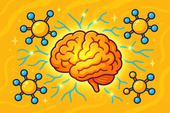
Phosphatidylserine and Dissociation: Supporting Cognitive Function
Phosphatidylserine helps calm the stress response by balancing cortisol, the body’s primary stress hormone. By lowering cortisol spikes, it protects memory, focus, and emotional stability — restoring clarity and mental presence for those struggling with dissociation 🧠🌿.
-
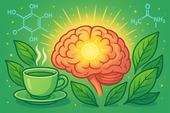
Can Green Tea Extract Help with Dissociative Brain Fog?
Green tea extract may help lift dissociative brain fog by supporting neurotransmitter balance, reducing inflammation, and enhancing energy at the cellular level. With its key compounds EGCG and L-theanine, it promotes calm focus, clarity, and emotional presence — helping you feel more alert and grounded 🍵🧠.

















































